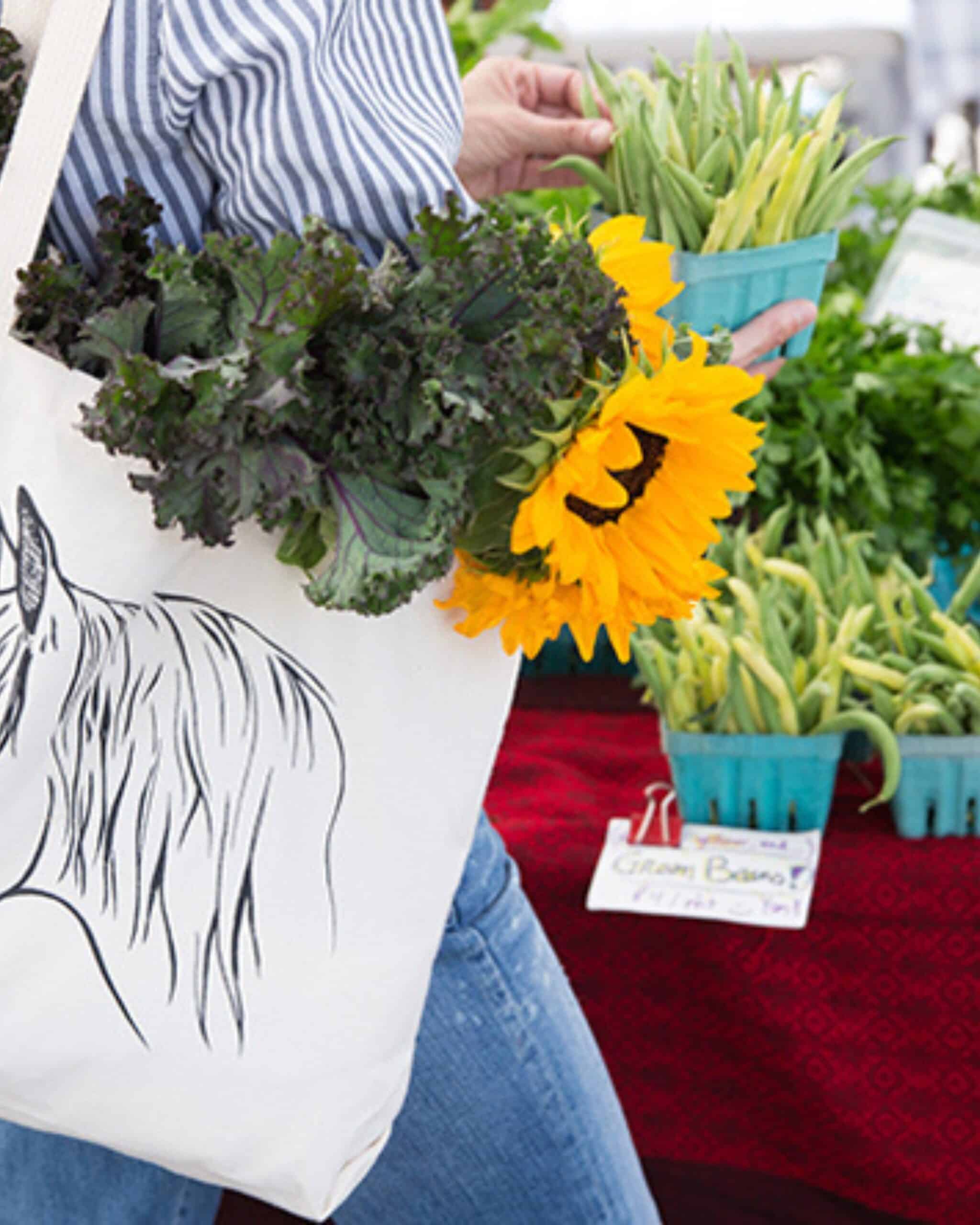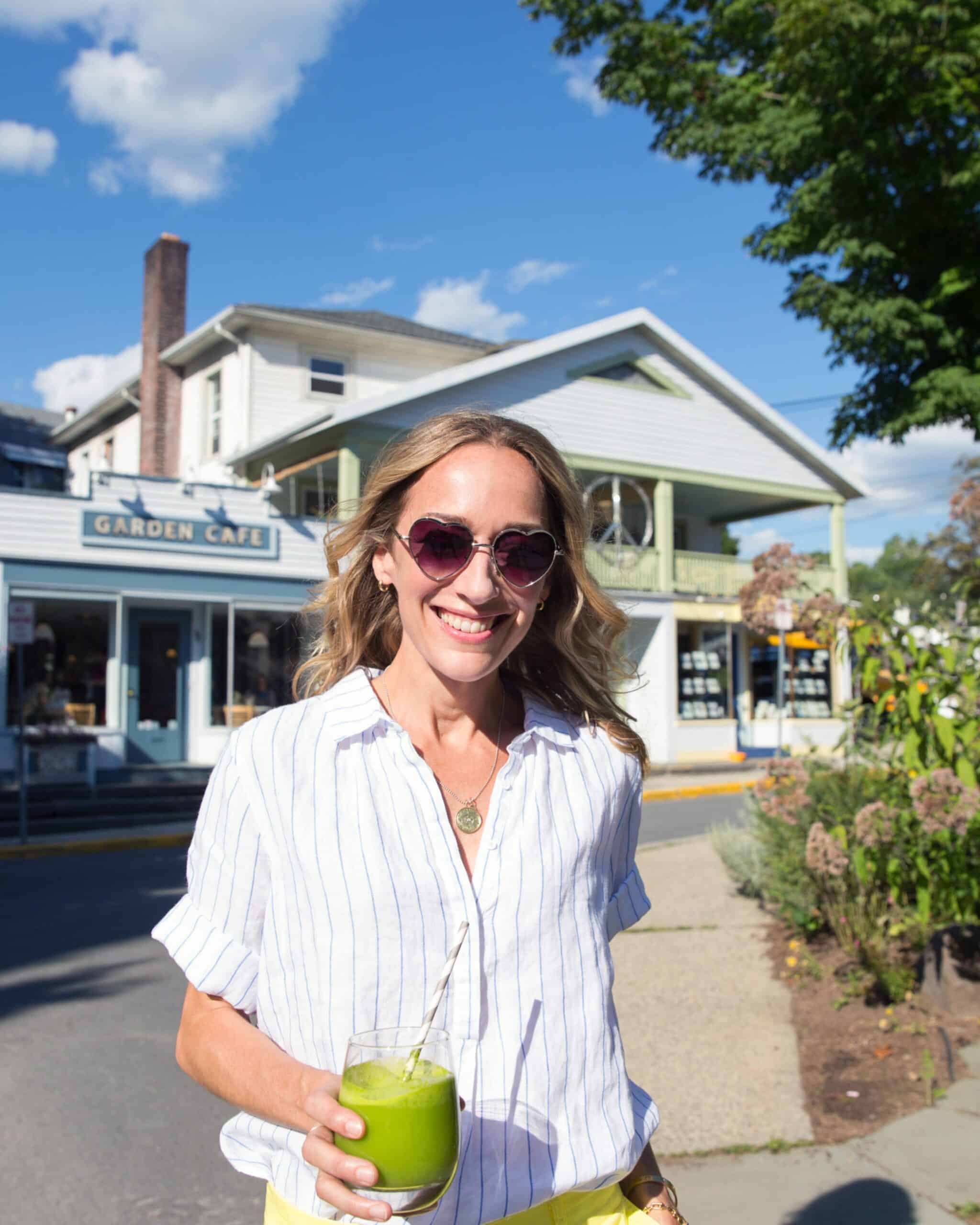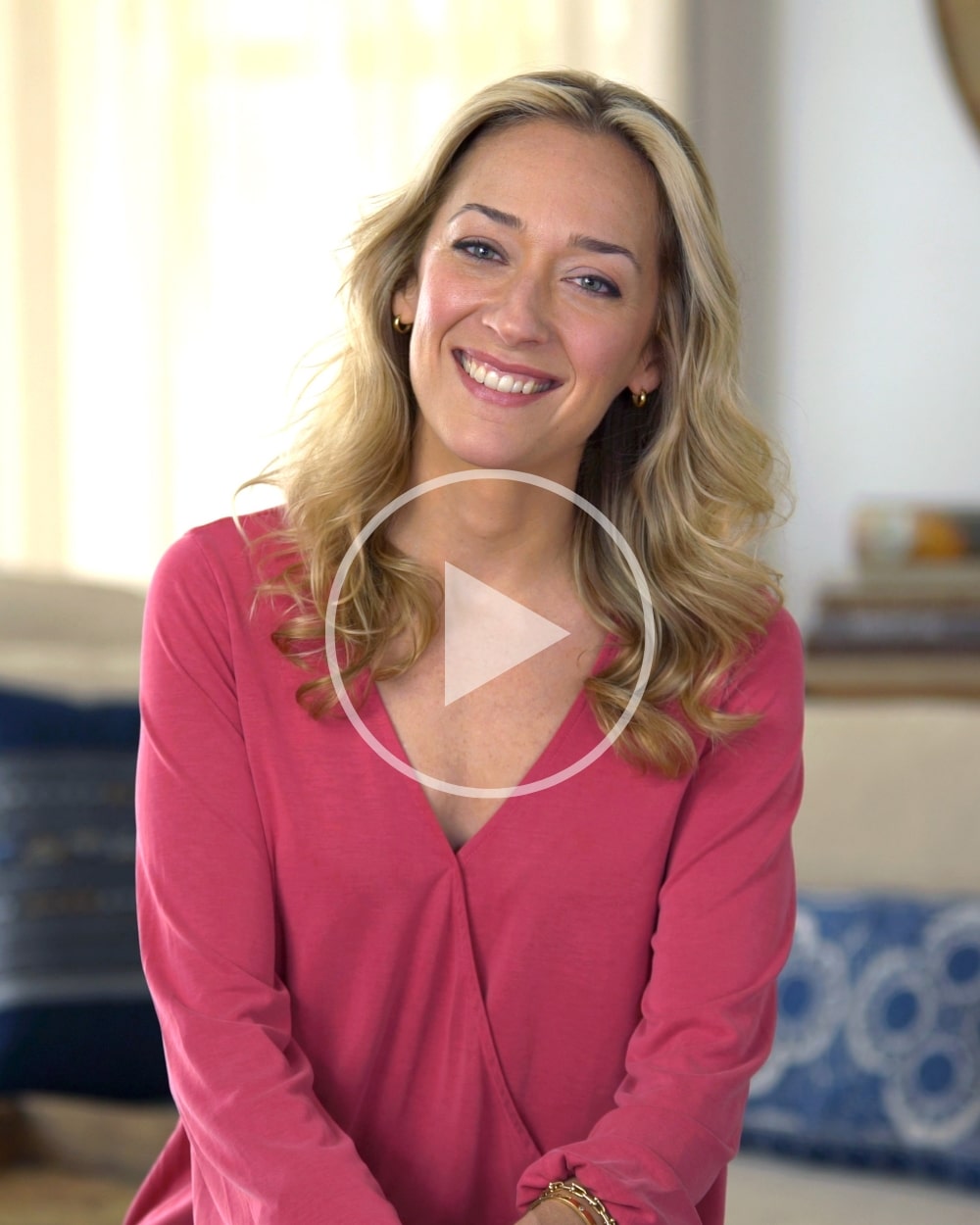Hiya Gorgeous!
Here in our wonderful online community, we chat about lots of fun and fascinating topics related to taking impeccable care of our internal environments (aka our bodies and minds, baby!).
But today I want to shift our focus to the beautiful environment around us. Because guess what?
Our internal environments are deeply (and forever) connected to the environment we live in. We can’t take care of one and neglect the other—our health and the health of our gorgeous planet depend on it. If cancer has taught me anything, it’s that.
If you’ve been following me for a while, then you know I’m passionate about protecting the environment. I try to live as consciously as I can and help others do the same. Now, I’m not perfect—who is?! But over the years I’ve learned simple ways to practice more sustainable living, and today I want to share some of those tips with you.
One more thing before we dive in, I know that articles like these aren’t always sexy page turners, but I gotta say, I’m concerned. Between the extreme weather patterns, rapid species decline, vanishing ecosystems and glaciers, life as we know it is undeniably changing and it has already begun affecting our health, jobs and futures.
Our home, this beautiful planet, needs each of us to step up and become responsible stewards—which includes using our vote. So let’s start by adopting a few simple habits (this is by no means a full list) that can make a big impact.
7 Surprisingly Easy Ways to Reduce your Environmental Impact
1. Say goodbye to disposable plastic straws (when possible).
This first tip has been big in the news lately. You’ve probably seen those awful pictures of our sweet sea turtle friends with plastic straws stuck in their noses.
The hard truth: By 2050, there will be more plastic in the ocean than fish (here’s a great resource on this subject). All of that trash floating around pollutes the water and kills the marine life. Imagine if your home was filled with someone else’s garbage—yuck!
One super impactful change we can make is to stop using disposable plastic straws when possible. That said, it’s important to keep in mind that they’re an essential tool for people with certain disabilities—something we can’t overlook as we work to reduce our impact on the planet. Here’s an article that covers this topic and offers easy solutions (win win!).
Sustainable living simplification tips:
- Celebrate your favorite local businesses when they use alternatives like biodegradable paper straws or reusable stainless steel straws. Tell them how much you appreciate their commitment to the environment with a stellar Yelp review or post on social media!
- When restaurants do offer you a straw, kindly refuse. This is your chance to spread the word! And remember—leading with compassion makes all the difference.
- Get a reusable straw for when you’re out and about. I love the FinalStraw because it’s easy to keep clean (check out the video on their homepage, so fun and sassy!).
2. Ditch disposable plastic water bottles, too.
Even though most disposable plastic water bottles are recyclable, the vast majority end up in landfills. Plus, manufacturing those bottles creates a lot of toxic waste, too. We don’t need disposable plastic bottles to lead easy, mobile, happy lives. Not so sure? I’ve got your back!
Sustainable living simplification tips:
- Get an eco-friendly, reusable bottle you love using. Klean Kanteen, Hydroflask and Yuhme are great options. Or, check out these sweet collapsible silicone bottles from que—great for travel! Plus, many of bottles are super versatile (they can hold both cold and hot liquids).
- Here’s yet another way to get more use out of your mason jars: Turn them into your to-go watering hole with a Cuppow! They’re sustainably produced and free of nasties like BPA and PVC.
- Now let’s talk about water filters. Just because you’re not using the packaged stuff anymore doesn’t mean you have to sacrifice safety. One purification and filtration system that many people swear by is the Berkey. I also put together a comprehensive guide to the best types of water filters so you can find one that’s right for you—check it out here!
3. Bring your reusable shopping/produce bags with you everywhere.
Whether you live in the city or the country, you probably see your fair share of plastic grocery bags on the street, stuck in tree branches, floating in the river and so on. They’re everywhere.
And the thing about those bags is that they’re not easy to recycle. Many grocery stores do have plastic bag recycling receptacles, but let’s be honest—we’ve already got plenty of errands on our to-do lists. Why not make things easier?
Sustainable living simplification tips:
- Most of us have a stockpile of reusable totes we’ve collected over the years, so let’s put them to work! Using what you already have is the most eco-friendly choice, but if you do need some, these reusable bags from Baggu are a good option. They hold up to 50 lbs and take up very little space, making them easy to keep on-hand.
- Don’t forget about produce bags. I like these purifyou bags for a reusable option. Or, consider just ditching the produce bag whenever possible. Think about it: Many fruits and veggies come with their own packaging—orange and banana peels, avocado and potato skins… You get the picture!
- Keep your bags and other reusable containers easily accessible by the door so you never forget to grab them on your way out.
4. Cut paper towels and napkins, not trees.
We’ve talked a lot about single-use plastic, but let’s not forget about paper. Many of us just grab a paper towel to clean up a mess or use several paper napkins when we’re out to eat without considering the consequences. It’s nothing to be ashamed of—we all have habits we’ve practiced for years.
Scaling back our use of disposable cleaning supplies is a simple, effective way to reduce our environmental footprints. And it’s a lot easier than you might think!
Sustainable living simplification tips:
- Give old t-shirts and towels new life by turning them into cleaning cloths. Simply cut them to a size that works best for you and toss ‘em in the wash when they’re dirty.
- Get a set of cloth napkins made from sustainable materials. The Little Market has lots of pretty handmade options (plus, you’ll be supporting a company on a mission to empower women artisans around the world). Or, try making your own with recycled materials—look at you, gettin’ all crafty!
- Keep a couple of reusable napkins in the glove box of your car so you’re not tempted to grab the disposable ones in a pinch.
5. Choose better personal care and cleaning products.
Most of us use many personal care and cleaning products every single day. These products can be harmful to the environment in a number of ways—the toxins they contain, the way they’re produced, how they’re tested (often on our furry pals—we can’t have that!) and so on.
And the environmental risks these products pose aren’t off in some distant future. They’re happening now. You’ve probably heard about the debate over problematic ingredients often found in sunscreen (oxybenzone and octinoxate). Growing scientific evidence indicates that these toxins can cause major damage to coral reefs—so much so that a city in Florida recently voted to ban the sale of sunscreens containing them!
Sustainable living simplification tips:
- Get friendly with EWG’s Skin Deep Database. This incredible resource will help you keep your cabinets and drawers clear of stuff that’s bad for you and the environment.
- Try DIY (check out some genius ideas for at-home beauty and skincare from Crazy Sexy Beauty Editor, Danielle Shine here and here)! We’re programmed buy, buy, buy, but one of the most sustainable things we can do is to take a more minimalist approach to cleaning and personal care products. If you do need to purchase something, consider supporting some of the badass companies doing their part to protect their environment. Juice Beauty, 100% Pure, breathe and puracy are just a few of my faves.
- Be mindful of how you dispose of bath and beauty products. It’s usually not safe to dump them down the drain. Brands like Origins have programs that will responsibly dispose of your empties (from any brand!).
6. Practice conscious online shopping.
Online shopping is more convenient than ever, but it comes at a price. Excessive packaging is one obvious challenge, but it doesn’t stop there. We’ve been trained to expect lighting-fast shipping. This has led to increased demand on unsustainable modes of transportation.
There’s a lot to unpack when it comes to this subject, so while I’m not going into detail here, I suggest watching this quick video—it totally opened my eyes!
Sustainable living simplification tips:
- When possible, choose the slower or no-rush shipping option. Doing this reduces the demand for fast, environmentally damaging transportation.
- For orders that contain more than one item, services like Amazon often offer the option to package items together instead of shipping them out one at a time as soon as they’re available. Selecting this option cuts down on packaging and inefficient transportation.
- Stay mindful! I’m not saying that we should stop online shopping altogether, but small adjustments can make a big impact. Try batching your purchases or picking something up from a local store when appropriate.
7. Make a difference with your plate.
You’ve heard me say this before, but I can’t overstate how damaging animal agriculture is to our planet. Raising beef and lamb for meat produces 250 times more greenhouse gas emissions than farming legumes (source). And according to the EPA, animal agriculture is the number one cause of water pollution.
Plus, more than 70 percent of antibiotics in the U.S. are used on animals to make them grow faster and to prevent disease in their unsanitary surroundings (source). This not only contributes to water pollution, but it also harms fish and other aquatic animals.
Simply put, plant foods have a much smaller environmental footprint than meat and dairy. We can feed more people all over the world AND protect our irreplaceable natural resources by including more delicious veggies, fruits, grains and legumes on our plates.
Sustainable living simplification tips:
- You don’t have to cut all animal products to make a difference. Start by treating meat and dairy as condiments rather than main dishes. You might be surprised how satisfying plant-centric meals can be. (Need plant-based protein ideas? Check out my guide here.)
- Try Meatless Mondays! This is an easy way reduce your consumption. Plus, it’s a chance to try out tasty new recipes like this Creamy Mushroom and Kale Pasta or this 1-Pot Lentil, Potato and Spinach Soup from my Test Kitchen Tuesday series!
- Wanna go all in for a few days? My Crazy Sexy Reset is a great way to immerse yourself in a plant-based lifestyle without diving into a long term commitment right away.
Before you go, I want to make one thing crystal clear: Pursuing sustainable living does NOT have to mean a 360 degree lifestyle makeover. But I won’t sugar coat it, we don’t have a lot of time to waste when it comes to taking better care of our environment.
So let’s take small, sustainable steps that make us feel good and do good for the world. It all starts with making little tweaks to our existing habits and coming up with smart ways to use the stuff we already own. We’re in this together, sweetheart!
Your turn: Which one of these sustainable living tips will you try? Let me know in the comments below (or share your own favorite eco tip) so we can be each other’s accountability buddies!
Peace and eco-lovin’,




Thank you Kris for this informative blog post! I started reducing waste about 2 years ago, and this year I’ll start to cut back on meat too. I actually used this experience to create a website with loads of tips (www.kempii.co.uk) It might be helpful for you and/or your readers. All the best and thanks for spreading the word on environmental conservation 🙂
thank you so much for this article i hope it will help others too like it did with me.
Valuable info. Lucky me I discovered your site by accident, and I am shocked why this
coincidence did not came about in advance! I bookmarked it.
Your eco-tips are awesome, Kris! I do my best every day to respect, appreciate and conserve our natural world by being aware and making conscious choices like the ones you shared. The one tip I will focus more on is using less paper towels, replacing them with cut-to-size cloth like old t-shirts. We’ve only got one Earth so thank you for inspiring us to take good care of our home!
I love these suggestions! I am a Norwex consultant & we sell a lot of products that are really sustainable. Microfiber cloths that replace all the disposables for cleaning & personal care, stainless steel straws, silicone lids to replace foil & plastic wrap, cloth napkins, lint mitt & more! I also just started using shampoo & conditioner bars (Ethique) & they are amazing! No more plastic bottles. Also started using Bite toothpaste tablets – no more tubes! I’m so glad that more companies are going green!
Many Mahalo’s Kris for your inspirational and encouraging posts, I love reading them and living by them… We already use a lot of these products. Being that we live on a small island we need to be so conscious of what we use, re-use and what toss up our land fills unnecessarily.
I want that Unicorn Bag! Where is that from?
Jennifer, You can get this darling Unicorn bag here: https://www.etsy.com/sg-en/listing/263061281/unicorn-canvas-tote-bag-screen-printed -Janine, Team Crazy Sexy
Thank you, Kris for putting in the time and effort to gather all this great information for us! I’m taking note of all the additional ideas from the commenters, too. On the plastics reduction front, I’d like to add another idea – reusable sandwich & snack bags (Wrap-N-Mat, Lunchskins, Bumkins, Planet Wise, ChicoBag are just a few of many brands). These are especially great for kids’ lunches. Think of all the ziplocs & cellophane NOT going into the trash every day. Such a great feeling!
Chris, thanks for the gentle reminder! I take my own utensils to work in my lunch bag as I hate to see all the plastic utensils just being used once then thrown away! I need to give a shout out to Stark skincare in Canada. I love their products, so simple yet effective.
Thanks, Kris! I bookmarked (for me more like Evernoted) so many of the resources in this very informative post.
Sue has a great point and I’ve been thinking about the ridiculous amount of utensils I use. Do you have any recommendations on travel utensils? Something easy to clean and light. I’m a performer + a NYer so carry so much in my backpack … every ounce helps!
One more thing … coffee cups! I’d love to hand one to a barista — any recommendations on a travel cup that’s the usual 8-12 oz size?
Hi Kris! Another wonderful blog post. I feel like I’m accomplishing something because I’ve got a good 5 of 7 of these covered! I admit to going back to probably too many paper towels. In Colorado, every drop of water counts and we pay for it, so I’m struggling with the paper or washing rags dilemma. Maybe folks have some additional tips for me! Also, got meatless Monday & Thursday and if I’m lucky, 1 more additional day added to those. Baby steps, but steps none the less. Thanks for all the reminders!
Happy that these served as good reminders for you, Dawn, and so wonderful that you’re already doing so much! I know what you mean about using extra water for washing. Maybe try bigger loads less frequently? I know they use more water than a small load, but at least you’re not running the machine all the time. Remember that this is all about doing your best, not about perfection. xo!
Every time I go to the grocery, I think ‘I really need to get reusable bags for my produce’, thank you for this reminder and the link. I just purchased these and they were on sale!
Wooohoo, Holly, that’s AWESOME! Hope they make your life a little bit easier and greener. Thanks for doing your part 🙂
Hi Kriss, thank You for those tips. I’ve been living using most of these tips for at least 20 years. I raised my son in Oregon (now I am back to my home country- Poland) and I used cloth diapers 90% of the time. Once my son was potty trained I started to use this diapers for cleaning and I still use them. This cotton cloths are great for windows, mirrors cleaning etc. I wish more new moms use cloth diapers. Greetings from Warsaw, Jolanta
Great tip, Jolanta! Thanks for sharing. xo!
Thanks
?
Hi Kris,
Thanks for this post. I’m a holistic nutritionist and teach healthy cooking to support women’s wellness – so I have more going on in the kitchen than your average bear. One of my favorite sustainability tips; use cotton, breathable produce cloth storage bags (I like Ecobag brand but there are lots of good brands out there). Storing your produce in the bags extends the life of your produce (reducing food waste big time), they’re washable and you can take them to the store and skip the plastic or paper bulk bag at purchase. Thank you for all you do and the for your role in the Hay House Cancer Summit last year – brilliant!!
Love this idea, Betsy! Some of the reusable bags don’t keep produce that well, so this is a great tip. Food waste is an important consideration, thanks for bringing it into the conversation. xo!
I haven’t used straws in a few years, we do recycle our plastic bags and other plastic that covers like toilet paper etc. , I keep my reusable bags in the trunk of my car. Plus I have two that fold up quit small in my purse. I am dairy free so that part is taken care of. I am cutting back on my meats.
Woohooo—sounds like you’ve already taken some great steps to reduce your impact, Shirley. Mwah!
I love tips for helping the environment…. best of all we can help one another help the environment with our support, suggestions and love. Cloth bags, good straws, no plastic water bottles, eat well, do some smart on-line shopping and get cleaning products that are easy on the environment. These are all great suggestions many of us have used and told others many times. You might want to post a copy of this list somewhere where you can see it. Thank you so much!!
Good point about keeping ideas like these right where you can see them! We all need reminders sometimes. Love ya!
Hemp could solve all of these problems. But certain industries don’t want ya to know that.
Hemp is a great resource, Sarah! I’m seeing it pop up more and more in personal care products and as a textile. Hope to see that trend continue. xo!
Our home is our sanctuary and we have made minor adjustments that are now leading to huge changes…for the better!
By simply cutting down on our consumption of meat a few times a week, we have embraced a more plant based diet and now, without even noticing, we have eliminated all meat from our diets!
In addition, I’ve been ditching some of my old cleaning products and habits. We keep a rag bag under the sink (old towels, T-shirt’s, socks) and uses them to clean. Lemon juice and vinegar are some go to tools. We even are unclogging our drains with baking soda and white vinegar (yes, it works!). We feel healthier inside and out. Living a more compassionate life has made me happier, healthier and calmer.?
Dawn! Your comment fills me with so much joy. You’re a beautiful example of how small changes can really make a difference (for you and the world). Mwah!
Fantastic article. I can do more starting today.
Thank you. Good read
Annie
Yay, Annie! No better time to start. xo!
What a fantastic and insightful piece, thank you so much. The video on conscious online shopping is such an eye opener. We’ve all got gradually sucked into high expectations on deliveries that are non essential but a little rethink and tweaking those expectations can have a huge impact.
I felt the same way, Tanya! Sometimes we just need a little reminder to step back and rethink our choices (big and small). Glad this resonated with you 🙂
Thank you Kris. We do need to step up a whole layer by investigating and researching for ourselves topics like war and 5G. World Beyond War is doing a fantastic job and has a brilliant array of workshops coming up in Washington in April. Also what is happening in the West Bank and Gaza Yemen and Venezuela. These are really hurting the environment and freedom and democracy. For 5G, GreenMedInfo has brilliant articles and videos. Also Waking Times.
Much love,
x
You’re right, Angela—so many of today’s issues connect back to the environment in some way. It’s important to dig deep and think about impact from many perspectives. Thanks for sharing these resources! xo
Amazing article kris- so informative. Thank u. I definately need to watch my plasticbags- iam good most of the time but forget my bags every now and then. The best thingswoolworths in australia did was stop providing free plastic bags.
So glad you enjoyed it, Claire! I love hearing about businesses stepping up to the plate on their end—the planet needs ALL of us. xo!